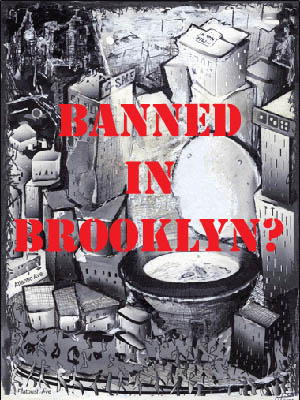
The discussion about the
Brooklyn Public Library's exclusion--some would say censorship--of certain works in its current show about the community surrounding the Atlantic Yards project continues. The
National Coalition Against Censorship is saying the exclusion of the works was censorship and takes the library to task for not including several works in the "Footprints" show. The group says:
When the Library offered to host the show, it also stipulated that some of the work, which could be perceived as advocacy against the pending development of the area, should be excluded. Even though the library offered other rationales– size and artistic merit – the political position advanced by some of the work was clearly the reason for the exclusion.
Is this censorship?
Libraries have traditionally been our best allies in defense of First Amendment freedoms. Librarians have gone to bat innumerable times to protect a book against groups calling for its removal and spoken fiercely in defense of the public’s right to access information freely. In this case, however, the BCPL made an error of judgment, which put them in the role of the censor.
The First Amendment defines censorship as the suppression of speech by public officials because of the point of view expressed in it. As the library personnel at BCPL are public officials and as the work was rejected because of its critical point of view, their action may well be defined as censorship.
Library officials insist that, because it “serves the entire community,” BCPL does not “offer platforms for one-sided advocacy on controversial political issues.” We doubt the library would reject a book because it laid out an argument on a matter of social importance no matter how one sided the argument was. Why reject an artwork?...
Removing work from a show because it takes a position on an important public debate not only goes against First Amendment principles, it also betrays the library’s mission to represent a diversity of viewpoints. It is a regrettable error of judgment on part of an institution that has traditionally been one of the most principled defenders of the free circulation of ideas.
A very reasoned and carefully worded opinion about the Library's actions, yet one that ultimately comes to negative conclusions about its actions.
 The discussion about the Brooklyn Public Library's exclusion--some would say censorship--of certain works in its current show about the community surrounding the Atlantic Yards project continues. The National Coalition Against Censorship is saying the exclusion of the works was censorship and takes the library to task for not including several works in the "Footprints" show. The group says:
The discussion about the Brooklyn Public Library's exclusion--some would say censorship--of certain works in its current show about the community surrounding the Atlantic Yards project continues. The National Coalition Against Censorship is saying the exclusion of the works was censorship and takes the library to task for not including several works in the "Footprints" show. The group says:
0 Comments:
Post a Comment
<< Home